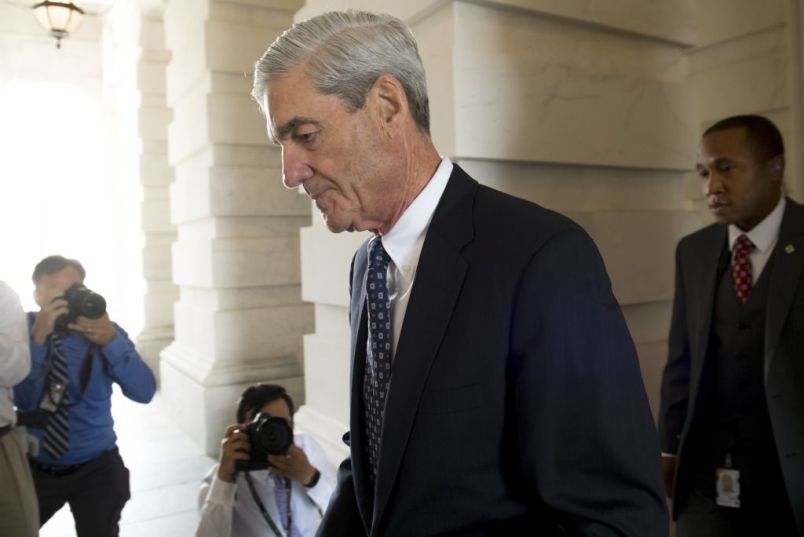A federal judge on Thursday declined to toss a conspiracy charge against a Russian company that allegedly sought to meddle in the 2016 U.S. election – but also warned special counsel Robert Mueller’s team of the lengths it will need to go to prove its case against the Russian company at trial.
The decision by U.S. District Judge Dabney Friedrich, is a win for Mueller, but also signals that if the case goes to trial it will not necessarily be smooth sailing for the special counsel.
When Mueller first unveiled in February the indictment against the Russian company Concord Management, and other Russian entities and individuals accused of meddling on social media in the election, few thought the case would go to trial, since Russia does not have an extradition agreement with the U.S. Concord Management, which is run by a Kremlin-tied oligarch known as Putin’s chef, surprised observers by lawyering up and showing up in court to fight the case aggressively.
Concord’s most recent efforts involved asking Friedrich, a Trump appointee, to throw out the one count in the indictment against the company — as well as against the oligarch himself, Yevgeniy Viktorovich Prigozhin, and his other company, Concord Catering — on the basis that the indictment itself doesn’t allege an actual crime.
Friedrich’s lengthy opinion Thursday rejecting that motion to dismiss focused in large part on the indictment’s reliance on the specific claim that Concord Management knowingly sought to hinder specific U.S. government agency functions. The count in question charges a conspiracy against the U.S., and Mueller had argued that Concord had impeded the Justice Department’s ability to enforce the Foreign Agents Registration Act, which requires foreign lobbyists to register, as well as the FEC’s ability to regulate foreign contributions.
Friedrich wrote in her order that because the government was so specific in its indictment that Concord Management defrauded the U.S. by impeding the government’s ability to monitor certain disclosures by foreign entities, Mueller’s team may have to prove that those disclosure laws did in fact apply to Concord Management.
“The difficulty for the government, however, is not identifying deceit—of which there is plenty—but connecting that deceit to the lawful government function of ‘administering federal requirements for disclosure,’ which the defendants allegedly conspired to impair. When coupled with a duty to report, the various acts of deception
immediately directed at private parties become relevant as a way to avoid detection for failing to comply,” Dabney wrote in the order.
“But it is difficult to see how the defendants’ deception would impair agencies’ ability to ‘administer’ disclosure requirements if those requirements did not apply to the defendants’ conduct. To be sure, not all conspiracies to defraud the United States by impairing the lawful functions of the FEC and DOJ must allege a legal duty to report or register,” Dabney continued. “But because this indictment alleges a conspiracy to impair those agencies’ functions of ‘administering federal requirements for disclosure,’ … the government may ultimately have to prove that the defendants agreed to a course of conduct that, if carried out, would require disclosure to the FEC or DOJ.”
In general, Friederich rejected Concord Management’s arguments that the conspiracy charge should be dismissed, affirming the government’s ability to bring the charge against the Russian entity. However, Friederich’s aside indicates that the government might have more work to do in proving that Concord Management had an obligation to disclose its activities.
Concord Management’s legal team, led by Reed Smith attorney Eric Dubelier, has taken a combative — if not inflammatory — tone in attacking Mueller in pleadings and at hearings. Friedrich so far has sided with Mueller on Concord’s effort to get the case against the company thrown out, but Thursday’s order was not the first time the judge showed skepticism towards the special counsel.
An opinion she wrote upholding Mueller’s authority said that “no statute explicitly authorizes the Acting Attorney General to make the appointment,” as she pointed to court precedents instead that backed the idea that his appointment was legal. The Roger Stone aide who has a taken his challenge to Mueller’s authority to an appeals court — where Concord Management has also argued against Mueller as a friend of the court — has pointed to that Friedrich opinion to bolster his attack on the special counsel.







I’m confused. If Concord is found guilty, who goes to jail, the attorney?
I continue to be amazed at how littleTierney Sneed understands about courts and judges,and how unerriingly she manages to hone in on the thing that DOES NOT MATTER.
JFC, WTF is wrong with Josh that he can’t see this?
No, because jail is but a type of sanction. Companies can be fined, put under sanctions, struck off the corporate registry books.
But IAE this case was never about prosecuting Concord to trial. The purpose of the OSC filing this indictment functons like one of those “reports” so many dimwits and ignorant nincompoops, even among lawyers, keep insisting is coming from Mueller. THERE WILL BE NO SECRET REPORTS, NO STARR CONDEMNATORY NARRATIVES. Mueller reports thru talking indictments - indictments ARE his “reports”, and this one that includes Concord tells an important piece of the story.
It is never smooth sailing when you go to trial. That’s why most people avoid it like the plague.
I seem to recall that the more recent related complaint against Pirgozhin’s accountant demonstrated that the trolls continued their antics after the original indictment and their lawyers’ claims of ignorance of FARA, registering with DOJ, etc…